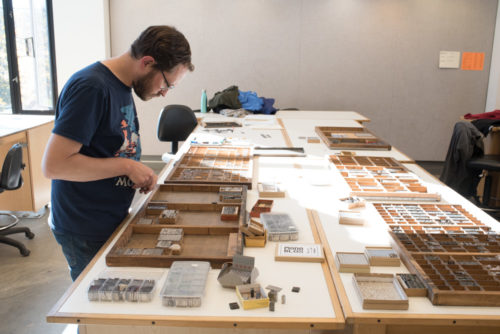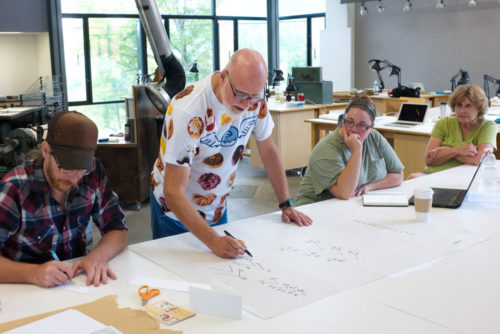Penland Letterpress Program

The Penland letterpress program offers beginning to advanced workshops in traditional and contemporary methods. The letterpress studio provides the space and specialty equipment to explore typography and image-making through the lens of materials and craft, via work in primarily two-dimensional and folded formats. The technical and conceptual scope of each workshop is determined by the instructor with input from our program director and support from our programming staff. Our versatile facility and high caliber artist/educators allow us to provide relevant programming in topics from type setting to experimental image making and artist books and everything in between. We strive for a balance of technical and aesthetic content and value all cultural and historical perspectives. We offer workshops that inspire and challenge students from curious beginners to accomplished professionals. Our programming is current in spirit and respectful of craft traditions.
The studio is very flexible, but is particularly well equipped for letterpress processes such as handset type, photopolymer plates, relief printing, and pressure printing. The range of workshop topics includes but is not limited to expressive typography, text as image, linoleum block printing, modular pattern, wood engraving and woodcut, poetry and print, digital fabrication for letterpress, pop ups and ephemera, letterpress as a social medium. Traditional letterpress processes as well as other approaches such as digital imagery, mixed media, and performance may be used to translate the written word or in the exploration of imagery and abstraction. Topics also include design and composition, color theory, and idea generation. Recent instructors include Steve Miller, Eileen Wallace, John Horn, Bridget Elmer, Julie Chen, Martin Mazorra, Gaylord Shanilec, Caren Florance, Sara Langworthy, Bryce McCloud, Eleanor Annand, Brad Vetter, and Sarah Bryant, among many others.
Our workshops take place in a well-equipped, well-maintained, and safe studio designed to accommodate diverse content and working styles. There are work tables for each student, pin up space, a darkroom with exposure unit, and an extensive selection of metal and wood type, ornaments, and press furniture.


Equipment
The Paul Hayden Duensing Letterpress Studio is equipped with the following:
- Vandercook Proof Presses: SP15, No. 4T, No. 4 (2), No. 3
- (3) Chandler & Price Pilot presses
- Chandler & Price NS, 8″ x 12″ platen press (motorized)
- Poco Proofing Press
- Metal, wood type, and a small collection of borders, ornaments, and cuts
- Daredevil furniture, Rotary Angle Chase (Dry.), Lego base, and P22 Blox
- Boxcar bases (standard) 13” x 19”, 12” x 16” (2), 6” x 9” (2), and a 6” x 9” deep relief
- Bunting magnetic bases 9” x 12”, and 6” x 9”
- Variety of hand brayers
- AZ PA520 Inox photopolymer platemaker (A3)
- Light table (36″ x 24″)
- Flat files (50″ x 38″)
- Chandler & Price guillotine
- Hobbs board shear
- (4) 18″ x 24″ wire drying racks
- (12) 72″ x 30″ individual work tables with cabinets
- Three iMacs with Adobe CC
- (2) Epson Stylus Pro 3880s
- Boss Laser LS-2440 – 65W
This list of equipment is intended to give you an idea of what the studio is like. It is a general description of equipment and may change before your session. The equipment used by your class will be determined by your instructor and will be appropriate to the techniques covered in your class. Students are welcome to bring favorite personal hand tools for use in the studio.
Supplies and Materials
Shared supplies such as inks and solvents are available in the studio and are normally included in your summer tuition. An additional studio fee will be assessed in classes that use a large volume of these supplies or require special materials. You will be notified in advance if a studio fee greater than $50 is expected. During concentration, shared supplies are not included in tuition, therefore each class will be assessed a studio fee based on all shared materials usage.
You are responsible for bringing other supplies needed for individual work. Please refer to your instructor’s material list for specifics about materials needed for the class. Rags will be supplied for solvent use and must be disposed of in one of the studio’s marked flame-resistant cans. In order to reduce waste, paper towels are NOT provided, so please plan to bring 3-4 cotton towels for your personal non-solvent use. If you feel the need to use paper towels, please bring enough rolls for the duration of your session.
The school maintains a comprehensive hazardous waste program and asks that you limit the materials you bring to campus to those classified as non-toxic. The material must be in its original packaging. An environmental fee will be assessed for classes generating hazardous waste. In order to limit the hazardous waste generated in the studios, we cannot allow students to bring toxic materials outside of the class supply list into studios.
Toolkits
Toolkits are NOT provided in the letterpress studio. Please refer to your instructor’s material list for specifics about personal tools needed for the class.
Classroom
The main classroom is a large open room with tall ceilings and expansive windows. It is equipped with snorkel ventilation for press clean-up, a flammables cabinet, a sink, and a 4’ x 16’ group worktable. The maximum class size is 12 students.
Student Workspace
Students work at individual worktables that are 30” x 72” with lockable cabinets. Each workspace is equipped with clamp-on lamps and padded chairs.
Safety Information
A first-aid kit, fire extinguisher, eyewash station, and safety shower are located in the print and letterpress studios. There is a mandatory safety walk through at the beginning of every class. The walk through is to introduce you to the studio space and to show you the safety equipment. North Carolina Health regulations do not permit Penland to provide safety equipment for shared use. Therefore, items such as dust masks, respirators, gloves, and aprons are sold in the supply store. You may prefer to bring your own from home. Please refer to your instructor’s material list for specifics about safety equipment needed for the class. Flameproof cans are provided to collect hazardous waste, such as rags used with mineral spirits or other solvents. In addition, there is an estimated $10 hazardous waste removal fee per student to cover the costs of safely disposing of ink and solvent waste. Alcohol is not permitted in the studios. Working in the studios under the influence of alcohol is not permitted. The use of illegal drugs at Penland is prohibited.
Shared Studio Equipment
Shared space/music: Each class should discuss the playing of music and reach a consensus on the time of day, the volume, and the type of music to be played. Tolerance and consideration are expected from everyone.
If you wish to use equipment in other studios on campus during your session, you must work with the instructor, studio assistant, and coordinator of that studio to arrange access. They will determine if the desired usage is compatible with their class’s activities and if you are able to work safely and independently with the equipment.
Session Schedules
Each session starts with an all-school meeting Sunday evening at 5pm followed by dinner in the Pines. Classes start Sunday at 8:30pm. Classes end and studio clean-up takes place the day before your session ends. The last day of each session is reserved for farewells and an all-school exhibition of work created during your time at Penland.
Everyone must participate in studio clean-up; if you must leave early, please ask the studio assistant to assign you clean-up tasks you can accomplish before your departure.
If you have questions, contact:
Studio Coordinator: Adam Leestma
Office: 828-765-2359 x 1328
E-mail Address: print@penland.org


